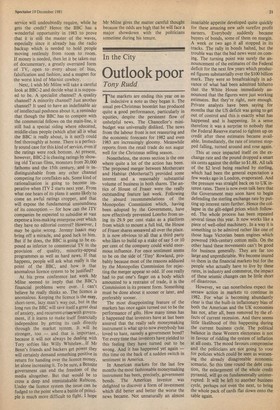Outlook poor
Tony Rudd
The markets are ending this year on as 1 indecisive a note as they began it. The usual pre-Christmas boomlet has produced quite a good performance, particularly in equities, despite the persistent flow of unhelpful news. The Chancellor's minibudget was universally disliked. The news from the labour front is not reassuring and the economic forecasts for 1982 and even 1983 are increasingly gloomy. Meanwhile reports from the retail trade do not augur well for the Christmas selling season.
Nonetheless, the stores section is the one where quite a lot of the action has been.
The proposed merger between Mothercare and Habitat (Mothertat?) provided some interest and a reasonably substantial volume of business in both shares. The an tics of House of Fraser were the really outstanding feature last week. Following the absurd recommendations of the Monopolies Commission which, having been adopted by the Government, have .
now effectively prevented Lonrho from using its 29.9 per cent stake as a platform from which to mount a full bid, the House of Fraser shares seesawed all over the place. It is now obvious to all that a third party who likes to build up a stake of say 5 or 10 per cent of the company could wield enormous influence. For once sentiment seems to be on the side of 'Tiny' Rowland, pro bably because most of the reasons adduced by the Monopolies Commission for rejec ting the merger appear so odd. If one really had to put one's finger on a body which amounted to a restraint of trade, it is the Commission in its present form. Something must be done about it sooner or later, and preferably sooner.
The most disappointing feature of the markets has once again turned out to be the performance of gilts. How many times has it happened that investors have at last been assured that the really safe moneymaking instrument is what up to now everybody has loved to hate, namely a government bond?
Yet every time that investors have yielded to this feeling they have turned out to be wrong. And it has happened yet again — this time on the back of a sudden switch in sentiment in America.
In American markets for the last few months the most fashionable moneymaking instrument has been, precisely, government bonds. The American investor was delighted to discover a form of investment which did better and better the worse the news became. Not unnaturally an almost insatiable appetite developed quite quickly for these amazing new safe surefire profit earners. Everybody suddenly became buyers of bonds, some of them on margin. A week or two ago it all stopped in its tracks. The rally in bonds halted, but the trouble was that the bad news went on coming. The turning point was surely the announcement of the estimates of the Federal deficit for the next few years which produced figures substantially over the $100 billion mark. They were so breathtakingly in advance of what had been admitted hitherto that the White House immediately announced that the figures were just working estimates. But they're right, sure enough. Private analysts have been saying for months that the US deficit was going to get out of control and this is exactly what has happened and is happening. In a sense therefore it was a surprise to nobody that the Federal Reserve started to tighten up on credit after these estimates became available. Immediately, the rate of interest stopped falling, turned around and rose again.
This at once impacted itself on the exchange rate and the pound dropped a smart six cents against the dollar to $1.88. All talk of the $2 level being reached by sterling, which had been the general expectation a few weeks ago in London, evaporated. And the pressure was straight back on to UK interest rates. There is now even talk here that the Government may soon have to begin defending the sterling exchange rate by putting up interest rates further. Hence the collapse in the gilt-edged prices which followed. The whole process has been repeated several times this year. It now works like a piece of well-oiled machinery. In a way it is something to be admired rather like one of those huge Victorian beam engines which powered 19th-century cotton mills. On the other hand these movements can't be good for business generally. They are far too large and unpredictable. We become inured to them in the financial markets but for the people who actually have to live by these rates, in industry and commerce, the impact of these seismic changes can be little short of disastrous.
However, we can nonetheless expect the seesaw action in markets to continue in 1982. For what is becoming abundantly clear is that the built-in inflationary bias of both the American and the UK economies has not, after all, been removed by the effects of current recession. And there seems little likelihood of this happening during the current business cycle. The political balance in these Western electorates is not in favour of ridding the system of inflation at all costs. The mood favours compromise and the politicians are not going to vote for policies which could be seen as worsening the already disagreeable economic scenario. So this time round the debt creation, the enlargement of the whole credit pyramid, will go on fundamentally uninterrupted. It will be left to another business cycle, perhaps not even the next, to bring the whole pack of cards flat down onto the table again.


































































 Previous page
Previous page